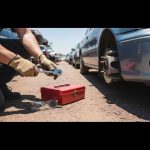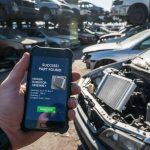Ever been late for work because your modern car decided to throw a tantrum? You’re not alone. Many drivers of modern vehicles often encounter common problems like engine sputtering that can turn a smooth ride into a nightmare. But here’s the kicker, most of these issues can be avoided with some basic knowledge, regular maintenance, and the help of a professional mechanic.
Recognizing early indicators of trouble, such as engine sputtering, transmission, or electrical problems, can save you time, money, and stress down the road. Regular check-ups by a professional mechanic play a crucial role in preventing these common issues in modern vehicles from escalating into major repairs. After all, normal wear and tear on system components is one reason why cars start acting up, and why your engine light might come on. So buckle up, we’re diving deep into understanding these pesky car troubles!

The Top 10 Most Common Car Problems Drivers Encounter
Engine and Transmission Issues
Issues with vehicles like modern cars can ruin your day, especially when problems such as engine sputtering and transmission slipping occur. Engine sputtering in these motor vehicles could be due to elements like bad spark plugs or dirty fuel injectors, which disrupt the fuel burning process in your car’s motor. If these parts of the exhaust system don’t function properly, your motor can stutter or even stop. Transmission slipping, another common issue in modern cars, means your vehicle’s engine might not accelerate as expected or could unpredictably change gears.
This can happen if your transmission fluid is low, your gears are worn out, or your vehicle’s radiator is malfunctioning. Even small sensor issues within the fuel economy system can lead to bigger problems, so don’t ignore them. Serious issues like engine failure caused by overheating, oil leaks, or broken parts in your vehicles need immediate attention. So, if your engine sputters or your transmission slips, get it checked by a pro to avoid serious damage.
Brake Problems
As an experienced driver, you’ve likely faced many vehicle problems, with brake issues and engine sputtering being quite common. Brakes and the motor are important for safety, so it’s key to keep them and your vehicles working well. Common vehicle repair problems include worn-out brake pads, warped rotors, brake fluid issues, and a sputtering engine.
Brake pads, crucial for halting your motor vehicle, can wear thin over time and become less effective. Warped rotors, the part brake pads press on to stop the car, can create a pulsing feeling when braking and slow your stopping time. Similarly, transmission problems, faulty sensors, or worn-out spark plugs can also impact the efficiency of your motor.
Lastly, issues with brake fluid, a key factor in your car’s safety and fuel economy, can cause weak brakes and slow stopping. This can lead to the need for costly repairs. Knowing these problems can help you spot issues before they become big, saving you money on both repair and fuel economy and keeping you safe. Always remember to maintain your car regularly, including checking bulbs, and pay attention to any changes in how it drives to avoid these brake problems.

Tire Troubles
Tire problems, a common safety issue for car owners, often result from wear. Worn-out tires can make your car use more fuel and are caused by driving on different roads and weather conditions. Punctures caused by sharp objects, like nails, can lead to flat tires, which can be dangerous and require repair. Additionally, worn-out bulbs can also contribute to safety issues.
Regularly checking for punctures and transmission fluid can help avoid performance issues. Tire pressure problems and faulty sensors can also affect your car’s handling, fuel use, and the need for repair. Too low pressure wears out tires faster and uses more fuel, while too high pressure risks tire blowouts. Similarly, improper transmission fluid levels can impact your car’s functionality. Therefore, tire issues like wear, punctures, pressure problems, and transmission-related concerns can seriously affect your car’s performance, safety, and fuel economy.
Battery Blues
Common issues often arise with car batteries and transmission. Problems can be caused by leaving your vehicle lights on too long, having a broken alternator or transmission sensor, or just having an old battery in need of repair. The alternator is important because it charges your battery while you drive. If it’s broken, your battery won’t charge, and your car can stop running.
Batteries usually last 3-5 years, but it also depends on the transmission and sensor use in your vehicle. If your battery is old or has a repair issue, it might be time for a new one. To keep your car running well, turn off your lights when you’re not using them, check your alternator and transmission sensors if they might be broken, and keep track of how old your battery is. Vehicle batteries, transmission systems, and sensors are important and need to be taken care of so we don’t have car problems.

Alternator Failure: Signs of Low Charge
What’s an Alternator?
Before we delve into the signs of alternator failure, which could be one of the transmission problems, let’s briefly touch on what an alternator is. It’s the part of your car that keeps all the electrical systems, including sensors, running once the car starts. It’s also responsible for recharging the car battery and may need repair if not functioning correctly. So, you can see why it’s critical to keep this component in good shape!
Signs of Low Charge
- Dim or Flickering Headlights: Your headlights run on the electrical power from your alternator. If it’s not providing enough juice, your headlights might be the first sign of trouble. They may dim or flicker, especially when you’re using other electrical components like the radio or air conditioning.
- Warning Light: Most cars have a warning light on the dashboard labeled “ALT” or “GEN,” indicating a problem with the alternator or charging system. If this light comes on, it’s time to take your car in for a check-up.
- Weak or Dead Battery: A weak or dead battery can also be a sign of a low charging alternator. If you find yourself frequently jump-starting your car, the problem might not be the battery. It could be the alternator not doing its job.
- Strange Noises: Alternators have several moving parts, including a rotor and a stator. If these start to fail, they can create some weird noises. If you hear a grinding or whining noise coming from your engine, it’s time to have your alternator checked out.

Alternator Vs. Battery: Spot the Difference
| Feature | Alternator | Battery |
|---|---|---|
| Main Function | Powers the electrical system and recharges the battery | Starts the car |
| Warning Signs | Dim or flickering lights could indicate a car issue. A pro tip to remember is that a warning light, weak or dead battery, or strange noises can also signal a problem. | Issue: Car won’t start, interior lights are dim, battery warning light on. Pro tip needed. |
| Lifespan | 7 years or 100,000-150,000 miles | 3-5 years |
Take Action
If you notice any of these signs, here’s a pro tip: don’t wait until your car won’t start, or worse, leaves you stranded on the side of the road. If you’re dealing with this issue, take your car to a trusted mechanic and have them check out your alternator. It’s a relatively quick and cheap fix compared to the cost and hassle of being stuck without a working car.
In a nutshell, knowing the signs of a low charge alternator can save you from facing an issue down the road. So, keep your eyes (and ears) open!
Electrical System Snags
Issues with the car’s computer system, lights, radio or other electronic components fall under this category.
Car problems often involve the computer system, which controls many functions like fuel efficiency, engine speed, and temperature. Issues here can mess up your car’s performance. Problems can also pop up with your car’s lights, including headlights, brake lights, and turn signals. If these fail, it can be dangerous because other drivers can’t see you well.
The radio can also have issues, which won’t affect safety but can make driving less enjoyable. Other vehicle parts like power windows, locks, and air conditioning can break too, which can be annoying and expensive to fix. If you notice anything different about how your vehicle works, don’t ignore it.
Addressing issues early can save you time, money, and stress later on. Even though modern cars are designed to be convenient and functional, issues can still arise. So, always keep an eye on how your vehicle is working to prevent these potential issues.
Cooling System Complications
An issue with a malfunctioning radiator, water pump, or thermostat could lead to overheating of your car’s cooling system.
Suspension Setbacks
Suspension problems can affect ride comfort and handling. This includes issues with shocks and struts among other components.
Exhaust System Errors
Experiencing exhaust system troubles? The issue could be a clogged catalytic converter or a leaking exhaust manifold!
Fuel System Failures
Fuel system failures include a clogged fuel injector or problems with the fuel pump which might cause your vehicle to run less efficiently.
Oil Leaks
Last but not least – oil leaks! They can be caused by a variety of issues, including bad gaskets or seals.
Remember: Regular maintenance checks can help you catch these common car issue early before they become bigger headaches!
The Dreaded Non-Start: Dead Batteries and Other Causes
Dead Batteries: The Usual Suspect
When your car refuses to start, it’s like your morning coffee failing to kick in. Frustrating, right? The most common culprit? A dead battery. It’s like a lazy employee not doing its job.
- Why it happens: Batteries die because of age, cold weather, or leaving your lights on overnight. It’s like forgetting to charge your phone – you’re not getting any calls in the morning.
- How to fix it: Jump-starting your car is the quickest fix. It’s like a shot of espresso for your car. If that doesn’t work, you might need a new battery.
But what if it’s not the battery?
Other Causes: Beyond the Battery
Your car might be acting like a stubborn mule for other reasons. Let’s look at a few:
- Faulty Starter: It’s like trying to start a lawnmower with a broken pull cord. You can replace it or have it repaired.
- Bad Ignition Switch: If your car’s not starting but the lights are coming on, it might be this. It’s like flipping a light switch and the bulb doesn’t light up.
- Clogged Fuel Filter: Your car needs gas to start, just like you need breakfast to start your day. A clogged filter can prevent fuel from reaching the engine.
| Cause | Symptoms | Solution |
|---|---|---|
| Dead Battery | No lights, no start | Jump-start or replace |
| Faulty Starter | Grinding noise, freewheeling | Replace or repair |
| Bad Ignition Switch | Lights on, but no start | Replace |
| Clogged Fuel Filter | Difficulty starting, poor performance | Replace |
Prevention: Better Safe Than Sorry
Avoiding a non-start situation is like avoiding traffic – it saves you time and stress. Here’s how:
- Regular Check-ups: It’s like a doctor’s visit for your car. Regular maintenance can catch issues before they leave you stranded.
- Drive Regularly: Cars, like people, need exercise. Regular driving keeps the battery charged.
- Turn Everything Off: Make sure all lights and electronics are off when you leave your car. It’s like turning off your computer at night – it gives your battery a break.
So, next time your car refuses to start, you’ll know it’s not just being difficult. There could be a genuine reason. And now, you’ll know what to do about it.
Recognizing Dead Battery Symptoms
Warning Signs
Your car gives off several signs when dealing with a dead battery. The engine might crank slower than usual, or the headlights could dim, especially when you’re running the AC or heat.
- Slow engine crank
- Dimming headlights
- Trouble starting the car
These are telltale signs of a dying battery.
Effect of Extreme Temperatures
Extreme temperatures can wreak havoc on your car batteries. Both sweltering heat and freezing cold can shorten a battery’s lifespan significantly.
- Heat causes battery fluid to evaporate, damaging the internal structure.
- Cold slows down the chemical reactions within the battery, reducing its power output.
Always protect your batteries from extreme weather conditions.
Regular Battery Checks
Regular checks on your car batteries are crucial. They help you spot any potential issues before they turn into major problems.
- Check for any visible damage like leaks or bulges.
- Test the battery voltage using a multimeter.
- Inspect the terminals for corrosion.
Don’t wait until your battery dies in the middle of nowhere. Be proactive about your vehicle maintenance!
Remember, recognizing dead battery symptoms is key to preventing most common car issues that drivers often encounter. Stay vigilant, folks!
Fuel Efficiency Woes: Causes and Solutions
Causes of Fuel Efficiency Woes
Fuel efficiency can be a real headache. But what exactly causes these woes? There are several factors at play:
- Driving habits: Heavy foot on the gas pedal? That’s a no-no. Rapid acceleration and braking can significantly reduce fuel efficiency.
- Vehicle condition: A poorly maintained vehicle can guzzle gas like there’s no tomorrow. Regular maintenance can keep your car running smoothly and efficiently.
- Type of vehicle: Some cars are just gas guzzlers by design. Larger vehicles and those with powerful engines tend to consume more fuel.
Solutions to Fuel Efficiency Woes
So, what’s the fix?
- Change driving habits: Ease up on the gas pedal. Smooth, gradual acceleration and braking can improve fuel efficiency.
- Maintain your vehicle: Regular maintenance is key. Keep your car in tip-top shape to maximize fuel efficiency.
- Choose a fuel-efficient vehicle: If you’re in the market for a new car, consider a model known for its fuel efficiency.
Comparison of Fuel-Efficient Cars
Let’s take a closer look at some fuel-efficient cars. Here’s a comparison table of some popular models:
| Car Model | MPG (City) | MPG (Highway) | Pros | Cons |
|---|---|---|---|---|
| Toyota Prius | 54 | 50 | High fuel efficiency, Reliable | Less powerful engine |
| Honda Civic | 32 | 42 | Good fuel efficiency, Comfortable ride | Less cargo space |
| Hyundai Ioniq | 57 | 59 | Excellent fuel efficiency, Affordable | Less engaging to drive |
Remember, fuel efficiency isn’t just about saving money at the pump. It’s also about reducing your carbon footprint. So, next time you’re behind the wheel, think about how your driving habits are impacting your wallet and the environment.
Addressing Poor Fuel Efficiency
Impact of Driving Habits
Bad driving habits? They’re a real gas guzzler. Slamming on the brakes, flooring the accelerator – these can suck up fuel like there’s no tomorrow. Easing up on your driving style can improve your car’s fuel economy, big time.
How can I improve my car’s fuel efficiency?
Improving gas efficiency can be achieved by maintaining proper tire pressure, limiting heavy loads in your vehicle and avoiding aggressive driving behaviors such as rapid acceleration and braking.
Regular Tire Pressure Checks
Ever tried riding a bike with flat tires? It’s tough, right? Same goes for your car. Low tire pressure means poor acceleration and more gas burned. Get this:
- Check tire pressure monthly
- Fill ’em up as needed
- Enjoy improved mileage
Simple but effective.
Clean Air Filters: Your Car’s Lungs
Think of air filters as your car’s lungs. When they’re clean, everything runs smoothly. But when they’re clogged with dust and debris, it messes up the fuel mixture in the combustion chamber. The result? More gas used and less power.
Here are some tips to keep those filters fresh:
- Replace air filters every 12,000 miles or so
- Check them regularly if you drive in dirty or dusty conditions
- Consider reusable filters – they can be cleaned rather than replaced
Remember folks, poor gas efficiency isn’t just about the price at the pump. It’s also about taking care of our planet by reducing emissions and conserving resources.
Solutions for Steering Wheel Shakes
Unbalanced Tires or Worn-out Suspension Components
The steering wheel in your car might start shaking due to unbalanced tires or worn-out suspension components. The connection is simple:
- Unbalanced tires can cause the steering wheel to shake because the weight of the tires is not evenly distributed around the wheel.
- Worn-out suspension components, such as shock absorbers and wheel bearings, can also lead to a shaky steering wheel.
Safety Risks
Ignoring these vibrations isn’t smart, it’s risky. Here’s why:
- A shaky steering wheel could mean a soft brake pedal, making it harder to stop quickly.
- Worn out suspension components can cause poor handling and loss of control.
These issues aren’t just annoying; they’re potential safety hazards.
Immediate Professional Inspection
Noticed your steering wheel shaking? Don’t wait! Get an immediate professional inspection service. Here are some benefits:
- Early detection of problems with your wheels or suspension components.
- Prevention of further damage which could lead to more costly repairs.
- Ensuring your vehicle remains safe and roadworthy.
In short, if you encounter a shaking steering wheel, don’t ignore it. It might be signaling more serious issues like unbalanced wheels or worn-out suspension parts. Get it checked out by a professional right away – better safe than sorry!
Deciphering Dashboard Warning Lights
Understanding Dashboard Lights
Got a warning light on your dashboard? Don’t freak out! It’s just your car’s way of telling you something needs attention. Here are the common ones:
- Engine Light: Also known as the check engine light. This could indicate a issue with your oxygen sensor or other parts.
- Oil Pressure Light: If this lights up, it means your oil pressure is too low. You might need an oil change.
- Battery Charge Warning Light: Seeing this? Your battery may be running low.
Don’t Ignore The Lights!
Think of these warning lights like a tap on the shoulder. They’re there to tell you something’s up before it turns into a bigger issue. So, don’t ignore them or you might end up with major damages that’ll burn a hole in your pocket.
When To Call In The Pros
Not sure what to do when a warning light appears? Here are some steps:
- Check if it’s an easy fix (like replacing bulbs or sensors).
- If you can’t figure it out, seek professional help ASAP.
Remember, these lights are not just for show – they’re crucial for keeping your ride safe and smooth!
Promptly Addressing Car Problems
To wrap up, it’s clear that car issues like dead batteries, poor gas efficiency, steering wheel shakes and dashboard warning lights are common headaches for drivers. But don’t panic! Quick recognition and prompt action can save you from a world of trouble down the road.
Remember, knowledge is power. A dead battery often gives warning signs before it fails completely. So if your car struggles to start or the lights dim when you turn on the AC, it might be time to get a new battery.
Fuel efficiency woes? Keep an eye on your driving habits and make sure your tires are properly inflated. If that doesn’t work, seek professional help.
Steering wheel giving you jitters? It could be as simple as needing a tire balance or as complex as a suspension issue. Either way, don’t ignore it!
Dashboard lights flashing like Christmas? Don’t play the guessing game. Get those codes read ASAP to avoid costly repairs later.
In conclusion, addressing these common car situations promptly not only keeps your ride running smoothly but also saves you money in the long run just like junkyards do. So stay informed, stay vigilant, and take action when needed!
FAQs
What should I do if my steering wheel shakes?
If your steering wheel shakes while driving, this may indicate an issue with your tires or suspension system. It’s best to have a mechanic inspect your vehicle to determine the cause and correct solution.
What does it mean when dashboard warning lights come on?
Dashboard warning lights are designed to alert you about potential issues with various systems in your vehicle. If one comes on while driving, it’s recommended to have it checked out by a professional mechanic immediately.
Why is my car struggling to start?
A car struggling to start can indicate several problems including a dying battery or faulty ignition switch among other things. Seek professional assistance for accurate diagnosis and repair.
How often should I replace my car battery?
Typically, most drivers need to replace their car batteries every 3-5 years depending on factors such as climate conditions and usage patterns.




